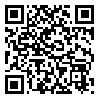Volume 16, Issue 2 (Summer 2021)
jmed 2021, 16(2): 120-130 |
Back to browse issues page
Download citation:
BibTeX | RIS | EndNote | Medlars | ProCite | Reference Manager | RefWorks
Send citation to:



BibTeX | RIS | EndNote | Medlars | ProCite | Reference Manager | RefWorks
Send citation to:
sadati L, Motaharipour M, Farajidana H, abjar R. Designing, implementing and evaluation of educational program of ethics in education by scenario-based discussion: A Scholarship study. jmed 2021; 16 (2) :120-130
URL: http://jmed.ssu.ac.ir/article-1-1220-en.html
URL: http://jmed.ssu.ac.ir/article-1-1220-en.html
Instructor, School of Paramedical, Department of Operating Room, Alborz University of Medical Science, Karaj, Iran. , ranaabjar@gmail.com
Abstract: (1330 Views)
Introduction: The commitment of faculty members to observe ethical principles and values in the role of a model leads to the strengthening of ethics in students and consequently the development of ethics in society. Therefore, universities need to promote and effectively teach ethics to their professors.
Methods: The present intervention study was designed, implemented and evaluated in the form of a scholarly activity following the Kern curriculum model. Initially, after reviewing the studies and needs assessment, the course objectives, educational content and teaching strategy were determined. Then, ten training sessions were held with a discussion-based teaching method based on real scenarios. All discussions in the classrooms were recorded and implemented. At the end of each session, participants were asked to submit scenarios based on their personal experiences. For evaluation, the number of participants and scenarios were evaluated and the discussions were analyzed and interpreted by content analysis.
Result: Data analysis confirmed the presence of 110 faculty members and the submission of 32 scenarios. In the qualitative section, 194 initial codes were extracted in four main categories: "commitment to teaching and student learning ", "ethics as law", "ethics-oriented educational atmosphere" and "teacher role model".
Conclusion: Considering the welcome of the faculty members and the extraction of key concepts, It is suggested to use this teaching method in the ability of professors to understand the principles of ethics in education, create moral sensitivity and strengthen moral decisions.
Methods: The present intervention study was designed, implemented and evaluated in the form of a scholarly activity following the Kern curriculum model. Initially, after reviewing the studies and needs assessment, the course objectives, educational content and teaching strategy were determined. Then, ten training sessions were held with a discussion-based teaching method based on real scenarios. All discussions in the classrooms were recorded and implemented. At the end of each session, participants were asked to submit scenarios based on their personal experiences. For evaluation, the number of participants and scenarios were evaluated and the discussions were analyzed and interpreted by content analysis.
Result: Data analysis confirmed the presence of 110 faculty members and the submission of 32 scenarios. In the qualitative section, 194 initial codes were extracted in four main categories: "commitment to teaching and student learning ", "ethics as law", "ethics-oriented educational atmosphere" and "teacher role model".
Conclusion: Considering the welcome of the faculty members and the extraction of key concepts, It is suggested to use this teaching method in the ability of professors to understand the principles of ethics in education, create moral sensitivity and strengthen moral decisions.
Type of Study: Scholarship |
Subject:
Medical Education
Received: 2021/07/2 | Accepted: 2021/08/23 | Published: 2021/09/11
Received: 2021/07/2 | Accepted: 2021/08/23 | Published: 2021/09/11
Send email to the article author
| Rights and permissions | |
 |
This work is licensed under a Creative Commons Attribution-NonCommercial 4.0 International License. |







